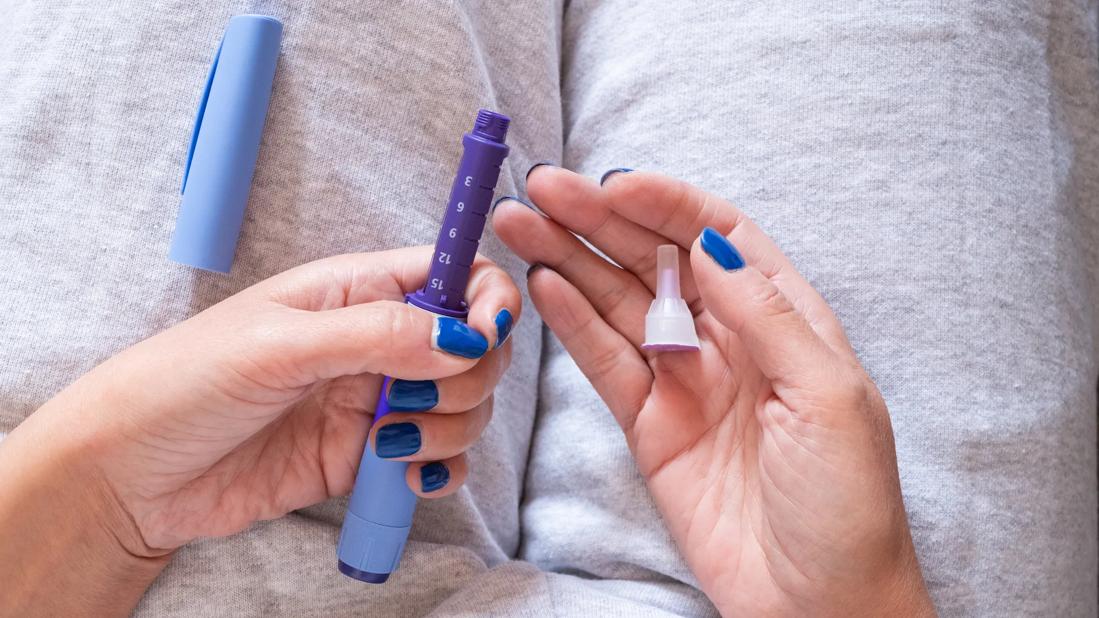Taking a smaller dose than what your doctor recommends isn’t a good idea

Image content: This image is available to view online.
View image online (https://assets.clevelandclinic.org/transform/cdefe005-ba1d-40c6-b860-cec6e2d35d7e/weight-loss-injection-2200929652)
Person holding medication injector in lap with their hands
If you take a GLP-1 agonist for weight loss or diabetes, there’s a good chance you may have heard about “microdosing” the medication.
Advertisement
Cleveland Clinic is a non-profit academic medical center. Advertising on our site helps support our mission. We do not endorse non-Cleveland Clinic products or services. Policy
But is the method of taking a smaller dose (or a microdose) really safe?
Obesity medicine subspecialist W. Scott Butsch, MD, explains why it’s not a recommended practice.
The attention around microdosing GLP-1s is tied to the use of compounded versions of the newer GLP-1 medications, specifically copied formulas of U.S. Food and Drug Administration (FDA)-approved semaglutide (Wegovy, Ozempic®) and tirzepatide (Zepbound, Mounjaro®).
Compounded versions are created by a licensed pharmacist using similar ingredients found in FDA-approved medications. You may need a compounded medication if your medical needs aren’t met by those approved by the FDA. For example, compounding may alter the form, such as creating a liquid or cream for people who can’t tolerate pills.
The general idea around microdosing GLP-1s is that you intentionally take a reduced amount of a medication. The primary reason is to make the drug last longer and, therefore, save money. For example, someone may have a prescription for 15 milligrams of Mounjaro but only take a portion of it.
This concept of microdosing GLP-1s gained traction due to obesity drug shortages shortly after these new, highly effective medications were approved in 2021 and 2022.
Advertisement
“Microdosing compounded versions of GLP-1s is different from adjusting the dose of FDA-approved drugs,” clarifies Dr. Butsch. “Adjusting dosages is a normal practice for healthcare providers regardless of the disease.”
Another important point? Compounded versions aren’t approved by the FDA, meaning there isn’t a process of verifying safety, effectiveness or quality of compounded medications before they’re marketed to consumers.
“I don’t recommend using compounded versions of these medications because they’re untested — both in their effectiveness and their safety,” stresses Dr. Butsch.
People may consider microdosing due to:
Most insurance companies don’t cover the cost of GLP-1s. So, if you want to take one of the newer GLP-1 medications like semaglutide or tirzepatide, you may be paying out of pocket for it. While costs varied widely at first, costs have dropped to around $500 per month through direct-to-consumer programs with drug companies.
People who experience side effects from the medication, like diarrhea, nausea and vomiting, may consider taking a lower dose with the hope that it reduces or lessens these uncomfortable side effects.
“If you take a reduced dose, you run the risk of the drug disappearing from your system faster than intended,” explains Dr. Butsch. “And when you take it again, you’re going to have that side effect again because there hasn’t been a steady amount of the medication in your system.”
Additionally, access and availability have been an issue. Studies show that people who stop taking the medication may regain the weight they’ve lost.
“Like any other medication, doctors can adjust GLP-1s based on their effectiveness, tolerability or side effects,” he adds. “That’s usually a conversation patients have with their doctors, who know a lot about these medications and how they work.”
Microdosing compounded versions of GLP-1s is different from having a doctor adjust the prescribed dosage of your GLP-1 medication. If you’re using a syringe and vial to draw up a smaller portion of the dose just to save money and make the drug last longer, there’s the real potential for contamination and overdosing.
There’s uncertainty around the effectiveness of microdosing compounded versions of GLP-1s and a lack of research on the safety of this method. That means questions remain on how your body may react to a smaller dose than what your healthcare provider prescribed.
Dr. Butsch also points out that there aren’t any official or standard guidelines for microdosing semaglutide or tirzepatide, and microdosing isn’t endorsed by the American Diabetes Association.
Bottom line? There’s a lack of research on the safety of microdosing and how it can benefit your health.
Advertisement
And even though it may seem like everyone on social media is talking about microdosing GLP-1s, you shouldn’t microdose your medication (or adjust your dosage) without consulting your healthcare provider first.
“A doctor can adjust the dose to the individual needs of each person,” affirms Dr. Butsch. “And that’s not microdosing — that’s just the art of practicing medicine.”
Advertisement

Sign up for our Health Essentials emails for expert guidance on nutrition, fitness, sleep, skin care and more.
Learn more about our editorial process.
Advertisement
There’s no set timeline, as factors like dosage, diet, exercise and stress levels can impact the effectiveness of the medication
These medications can increase fertility — but the risk of taking them while pregnant isn’t well known
Keto can reduce blood sugar, but that doesn’t mean it’s right for everyone
Lifestyle changes can bring a slight metabolic boost and health benefits
A consistent walking program is an effective way to drop pounds and lose body fat
This diabetes medication can treat obesity, but it’s not for people who just want to drop a few pounds
Successful weight loss takes a long-term commitment — build a healthy lifestyle you can stick with
Opt for snacks that have protein, fiber and healthy fats to prevent cravings and keep you feeling full and satisfied
Although it could be used as a moisturizer, this new trend is not recommended
Communicating clear limits helps protect your time, energy and emotional well-being
High cholesterol can be genetic, but testing and treatment can lower your heart disease risk